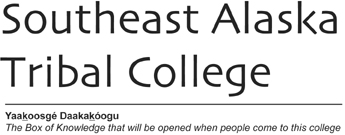

Board of Directors
Andy Hope
Ronn Dick
Marion Berry
Cecelia Tavoliero
Carlton Smith
Phyllis Carlson
Sue Stevens
Lee Wallace
Mary Duncan
Joyce Shales
Ed Warren
Administration
Ted Wright, Interim President
Elder Advisors
Joe Hotch
Dennis Demmert
Nora Dauenhauer
Jim Walton
Marie Olson
Lydia George
Isabella Brady
Gil Truitt
Charles Natkong, Sr.
Arnold Booth
Contact
(907) 586-1625
(907) 790-4406
(907) 723-8536
tedtrmp@aol.com
andy@ankn.uaf.edu
To: Native Educators/Leaders:
From: Andy Hope, Ted Wright
Chair and President: Southeast Alaska Tribal College
Re: NSF Grant to Tribal College
Date: Winter 2004
A Resolution
Purpose: Support leadership of the Southeast Alaska Tribal College as it appeals a decision of the Consortium for Alaska Native Higher Education (CANHE) and Illisagvik College, to the National Science Foundation.
Background: In July of 2001, the Consortium for Alaska Native Higher Education (CANHE) received a planning grant from the National Science Foundation’s Tribal College and Universities Program. This grant was to support the development of a proposal for a multi-year project to improve Native student academic success, through the regional tribal colleges organized as part of the work of the Alaska Rural Systemic Initiative. The grant was completed in 2002, but the proposal to initiate science, technology, engineering and math program activities through the tribal colleges was not funded. In late 2002 and early 2003 the proposal to the National Science Foundation was revised and re-submitted. This time the grant was awarded and the regional tribal colleges began to work with CANHE to plan for conduct of the activities outlined in the revised proposal.
In anticipation of receiving its share of the NSF grant, the Southeast Alaska Tribal College (SEATC) established an account at Well’s Fargo Bank and begun to develop systems to track income from grants and donations as well as expenditures for approved college activity, and to contract with people to do work under the terms of the grant. As a condition for receipt of funds, the Chair of CANHE declared that the SEATC and its regional Native non-profit partner, Central Council Tlingit and Haida Indian Tribes of Alaska, would have to come to terms on a Memorandum of Agreement. While management of the Tribal College did not believe it was within the CANHE Chair’s power to require it, we immediately called for a meeting with Central Council managers to outline terms of an agreement. During that meeting (May 23, 2003) both sides agreed that a merger of Central Council’s vocational training center and the tribal college was in the best interests of the Native people of Southeast Alaska, and that an agreement was workable.
Over a period of several months from spring through fall, 2003, leadership of the Southeast Alaska Tribal College attempted to meet with representatives of Central Council to finalize terms of the Memorandum of Agreement. For months the tribal college’s emails, letters and calls simply were not answered. Then, in the fall of 2003, management received a letter stating that no agreement would be forthcoming, and that essentially the regional non-profit would not be working on projects with the tribal college. Finally, in the fall of 2003, SEATC management learned (from a CANHE newsletter) that the grant funds applied for through CANHE were awarded to Central Council, thus side-stepping the tribal college altogether.
This decision proved to be devastating to the tribal college, as the NSF grant was to be the first source of funds and official activity of the college. Management had worked with CANHE for almost two years to outline activities that would tie into ongoing curriculum development and teacher training projects in the Southeast region. Essentially, the Southeast Alaska Tribal College had spent all of its organizational time and effort working toward receipt of the NSF funds. Every start-up organization needs that first spark to get started; and for the Southeast Alaska Tribal College, that spark was to be the NSF grant. Since these events, the chair and President of the SEATC have had to shift their focus to other work to make a living, and the tribal college has been dead in the water. This is an injustice that needs to be corrected, not just for the Southeast region’s tribal college, but also for every organization, tribe, or group that fights for survival in the shadow of a hostile or indifferent regional “partner.”
Resolution of Native Educators and Leaders
Whereas: Leadership of the Southeast Alaska Tribal College worked in good faith for more than two years with the Consortium for Alaska Native Higher Education, Illisagvik College, and Central Council Tlingit & Haida Indian Tribes of Alaska, to design educational program activities that would benefit Native people in the Southeast region, and
Whereas: The Consortium for Alaska Native Higher Education, Illisagvik College, and Central Council acted in bad faith and in a way that is contrary to traditional Native values of cooperation and respect, by removing the tribal college as the recipient of National Science Foundation funds, and
Whereas: Leadership of CANHE and Central Council have chosen not to communicate with the leadership of the Southeast Alaska Tribal College, on matters related to the National Science Foundation grant or on any other matter relevant to tribal college programs and activities, and
Whereas The leadership of the Southeast Alaska Tribal College has no recourse but to appeal the decision of the Consortium for Alaska Native Higher Education and Illisagvik College to the granting agency, the National Science Foundation,
Therefore Now Be It Resolved: The undersigned representatives of Native organizations and tribal entities respectfully asks that the National Science Foundation (1) remove the grant funds sub-awarded to Central Council through CANHE for the Southeast region and (2) direct said funds to the Southeast Alaska Tribal College, through a regional partner entity mutually agreed upon by CANHE and the tribal college.